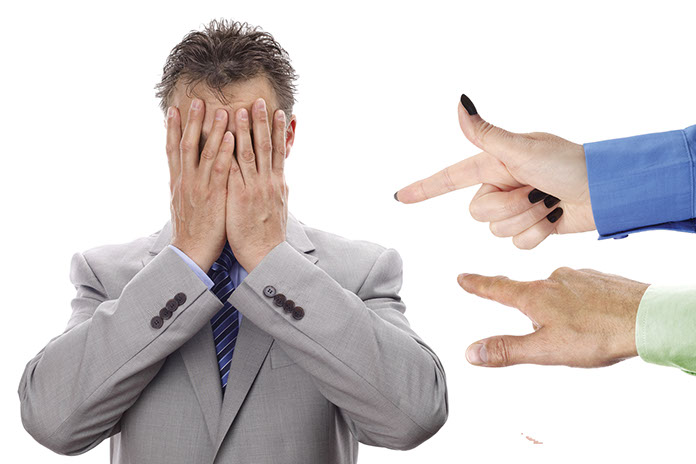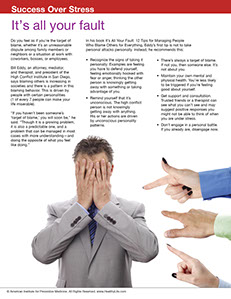SYMPTOM CHECKER
CONDITIONS
Male
Female
Child
Arm, Hand & Shoulder Concerns
Legs & Feet Concerns
Dental & Mouth Concerns
Ear & Nose
Eye Conditions
Head Conditions
Arm, Hand & Shoulder Concerns
Legs & Feet Concerns
Front
Back
Arm, Hand & Shoulder Concerns
Dental & Mouth Concerns
Ear & Nose
Eye Conditions
Head Conditions
Arm, Hand & Shoulder Concerns
Dental & Mouth Concerns
Ear & Nose
Eye Conditions
Head Conditions
Front
Back
Arm, Hand & Shoulder Concerns
Neck Links
Head & Neck Concerns
Arm, Hand & Shoulder Concerns
Neck Links
Head & Neck Concerns
Front
Back
Online Clinic
Wise Healthcare
It’s all your fault

Print on Demand
Do you feel as if you’re the target of blame, whether it’s an unreasonable dispute among family members or neighbors or a situation at work with coworkers, bosses, or employees.
Bill Eddy, an attorney, mediator, and therapist, and president of the High Conflict Institute in San Diego, says blaming others is increasing in societies and there is a pattern in this blaming behavior. This is driven by people with certain personalities (1 of every 7 people can make your life miserable).
“If you haven’t been someone’s ‘target of blame,’ you will soon be,” he said. “Though it is a growing problem, it is also a predictable one, and a problem that can be managed in most cases with more understanding—and doing the opposite of what you feel like doing.”
In his book It’s All Your Fault: 12 Tips for Managing People Who Blame Others for Everything, Eddy’s first tip is not to take personal attacks personally. Instead, he recommends this:
• Recognize the signs of taking it personally. Examples are feeling you have to defend yourself, feeling emotionally hooked with fear or anger, thinking the other person is knowingly getting away with something or taking advantage of you.
• Remind yourself that it’s unconscious. The high conflict person is not knowingly getting away with anything. His or her actions are driven by unconscious personality patterns.
• There’s always a target of blame. If not you, then someone else. It’s not about you.
• Maintain your own mental and physical health. You’re less likely to be triggered if you’re feeling good about yourself.
• Get support and consultation. Trusted friends or a therapist can see what you can’t see and may suggest positive responses you might not be able to think of when you are under stress.
• Don’t engage in a personal battle. If you already are, disengage now.
This website is not meant to substitute for expert medical advice or treatment. Follow your doctor’s or health care provider’s advice if it differs from what is given in this guide.
The American Institute for Preventive Medicine (AIPM) is not responsible for the availability or content of external sites, nor does AIPM endorse them. Also, it is the responsibility of the user to examine the copyright and licensing restrictions of external pages and to secure all necessary permission.
The content on this website is proprietary. You may not modify, copy, reproduce, republish, upload, post, transmit, or distribute, in any manner, the material on the website without the written permission of AIPM.
2021 © American Institute for Preventive Medicine - All Rights Reserved. Disclaimer | www.HealthyLife.com















































